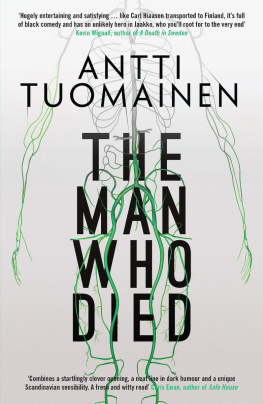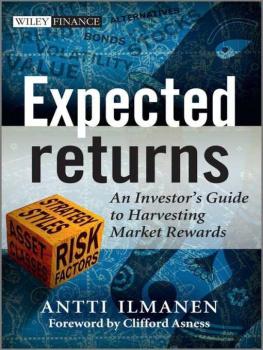Table of Contents
For other titles in the Wiley Finance Series please see www.wiley.com/finance
Foreword
The first time I met Antti Ilmanen I thought he was insane. I was right. But, I was to discover quickly he was insane in a good way. The incident in question was at a new Ph.D. student mixer, about as exciting as it sounds, where seconds after being introduced to Antti he asked me who do you rate in the top-five academics in finance and why? He had his own answers on a set of Post-it notes. By the way, Antti has become famous for these Post-it notes. Suffice it to say if he consults the Post-its, and says you said something 17 years ago that turned out to be disproved in the latest Journal of Finance paper, just assume hes right and move on.
Getting back to my story, he couldnt understand how I couldnt name five. Truth be told I probably could have named maybe three academics in total, and as to justifying my choices with why?, I was stuck at zero. I had not chosen finance because, like Antti, I was already obsessed with it. I chose it as my dad, a lawyer, forbade me to go to law school, I had some mild ability at mathematics, I recognized that finance might be both intellectually interesting and provide a good living, and finally I chose a Ph.D. as being a professor seemed like a nice life (little did I know the Sirens of Wall Street would soon call me away...) Antti looked at me with a what the heck are you doing in the Ph.D. program confused stare, and I politely ran away from the very intense, very finance-obsessed young Finn. Now, 20+ years later, and after countless similar incidents, I no longer run away (he finds me anyway), but hes still intense and obsessed with finance. Over the years, and specifically through this book, those traits of his have made us all better off.
One more aside before my foreword begins in earnest. I briefly considered not writing this foreword in protest or as a rearguard action. Antti gives away a lot in this book. Perhaps few true secrets (though there are some!), as this is more a textbook than original research. But he makes much of what has become called quantitative finance easily (OK, 300+ dense pages, in original format, of easily) accessible in one place. Long term, that cant be good for people like me who make their livings from this stuff being at least a bit secret. But being skilled at game theory I quickly determined that if I didnt write the foreword somebody else would, so refusal would not accomplish much. With that strategy shot down, I very fleetingly considered having him killed, but this seemed to entail too much tail risk (see Chapters 15 and 19) and, anyway, is at least somewhat morally ambiguous. Besides, Anttis just the type to have stashed a Post-it at his lawyer with a note in the event of my untimely... So in the end I decided to smile and write the foreword, and just resolve to work harder (along with many others at my firm and others throughout the field) to give Antti material for a sequel 20+ years from now!
Now lets talk about the title subject.
Expected returns are how much you make on average over time on an investment or strategy. Risk is the possibility that, over any time horizon, you never get your expectation, as once again the world interferes with a perfectly good plan. Risk can make you fail to reach your expectations because of the simple uncertainty around expectations it brings, or because, as in 2008 for many, bad realizations call into question long-term survival or at least the ability to stick with a plan. Still, expected returns are incredibly important. If you survive and stick to a good plan, they add up nicely.
Antti has chosen to write a book on expected return in the Age of Risk. Risk, and particularly risk in the sense of survival, is all the rage in these days following a major financial crisis. This wide-ranging discussion of risk is right and proper. If some investors took too much risk and that caused or exacerbated the financial crisis, thats a pretty important event to learn from. If some investors thought risk was simple and all figured out, and got a black swan dropped on their heads, it is important to learn from that too. However, its not the whole story.
While perhaps differing from the vast majority of risk-focused researchers and authors these days, Id argue that the study of expected returns deserves more of our attention, even just after one of the biggest left tails in history. For one thing, as scary as the world got, some of our much maligned simple normal models actually did OK for all assets other than highly structured and/or levered ones, or over the very short term (see http://www.dimensional.com/famafrench/2009/05/how-unusual-was-the-stock-market-of-2008.html). For another thing, in a theme Antti returns to again and again in his book, expected returns dont have to stay the same throughout time. Part of what we see as risk materializing during events like the 2008 financial crisis, and the 19992000 tech bubble, are more accurately seen as investors misunderstanding or misestimating expected returns. In both those cases the extreme dnouement that followed occurred, at least according to many (and me), because before the disaster, investors were willing to accept far too low an expected return, first on stocks and specifically on technology stocks, and then a decade later on credit and real estate. In both the theory and the reality of these globe-shaking events, the discussions of risk and expected return are intimately linked.
So why so much more discussion of risk than expected return these days? Well, obviously the magnitude of recent events makes all of us greatly value the chance we could have avoided that pain. But again, a careful study of expected return might have easily, perhaps even more easily, led to the same protection by avoiding certain investments on the ground that their expected returns were too low. Frankly, I think a lot of the answer is that discussing risk is inherently sexier than discussing expected returns. Good forecasts of expected return add up over the long term, but dont matter for squat next week. Risk can kill you, or make you a hero, in the time it takes you to say flash crash. Would you rather write about a tsunami or erosion? More specifically, from a safe perch, say the hindsight of authoring a book, which event would be more dramatic to narrate? The analogy, forced though it may be, continues to work as erosion, or expected return, might be mind-numbingly boring at any one moment, but it has a heck of a lot to say about how the future will be shaped.
For perspective, you want to see a black swan? Try making nothing on your equities in your final 20 years until retirement because you bought them at an extremely high price (low expected return). That is one pile of ebony long-necked bird. If risk is about surviving the short term, expected return is about whether, after surviving, you think it was worth it.
Heres another secret. Besides being at least as important, estimating expected returns is much harder than estimating risk. Now, estimating risk is no easy task. But at least finance wears its insecurity on its sleeve here. Are returns normal or do we have to worry about black swans, fat tails, and all that? This worry and effort is worthwhile, but those trying to estimate the expected return on various assets smile at those taking on the comparatively easy task of estimating risk. Basically, you need a heck of a lot more data to estimate expected returns than to estimate risk. In geek-speak, the first moment laughs at and taunts the second moment (which Im going to pretend for a second is all you need for risk). The second moment gives up its secrets reluctantly, but far more readily than that more covert first moment. To estimate risk we lament (as statisticians not humanitarians) that we dont get to see a few more disasters. To estimate expected return we lament we dont get to see a few more centuries.

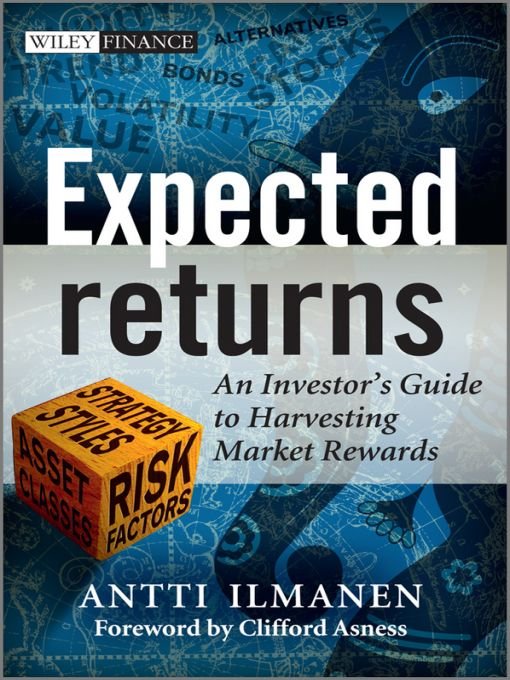
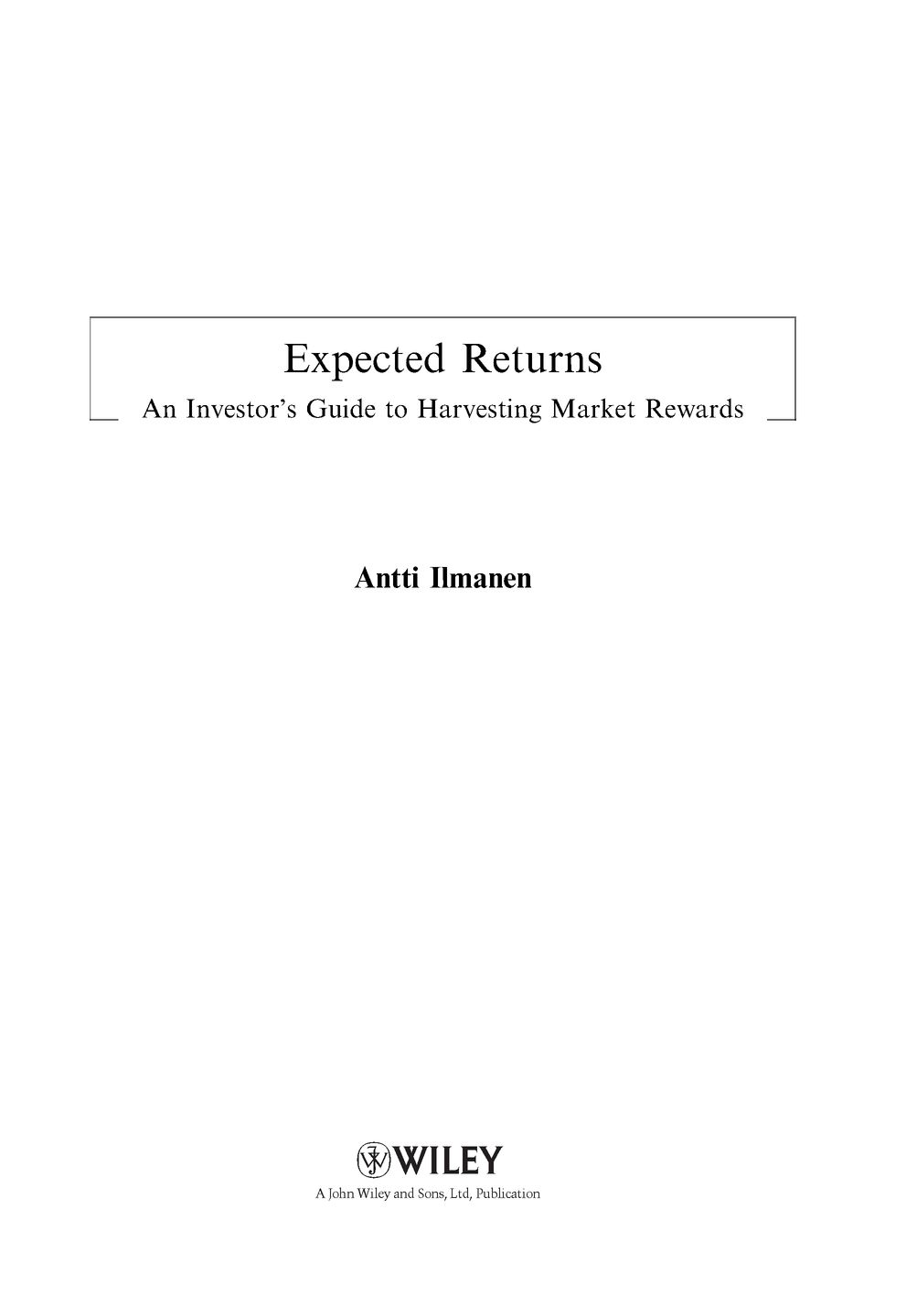





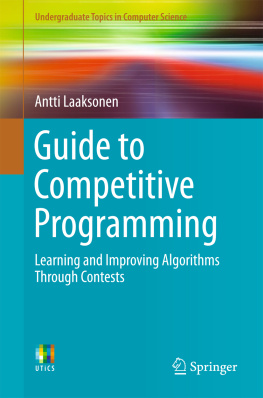
![Antti Tuomainen [Antti Tuomainen] - Little Siberia](/uploads/posts/book/140015/thumbs/antti-tuomainen-antti-tuomainen-little-siberia.jpg)

